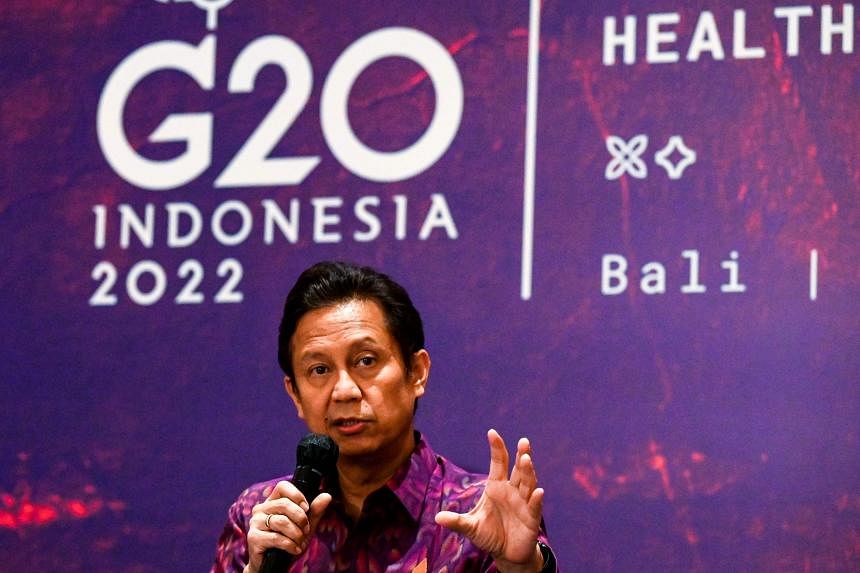JAKARTA – The Group of 20 (G-20) major economies have agreed on six key actions for the health sector, aimed mainly at making the journey from a pandemic-prone world to a pandemic-proof one as they navigate through two competitive geopolitical blocs on the back of the conflict in Ukraine, the group’s chair said.
Indonesian Health Minister Budi Gunadi Sadikin told reporters in Bali that a series of health leaders’ meetings that started in March and concluded on Friday have been able to establish, among other things, a pandemic fund called the Financial Intermediary Fund (FIF).
It will help countries prepare for future pandemics, recognising the need for more equitable health resource distribution and improved sharing of data to identify any pathogen – virus, bacteria or parasite – that could cause a future pandemic.
The group agreed to standardise Covid-19 protocols to make international travel easier and speed up economic recovery; expand research and manufacturing capacity for vaccines, therapeutics and diagnostics to help lower-income and developing countries; and step up the fight against tuberculosis, the second-deadliest infectious killer after Covid-19.
“We have come to this table with our own unique perspectives and differences... to work together in harmony, to build a better world with a stronger global health architecture that safeguards the health of today’s and future generations,” Mr Budi told the delegates attending the final leg of the health leaders’ meetings, two weeks ahead of the G-20 summit.
“The establishment of the pandemic fund is an example and evidence that we are very practical. The initiation of that fund by Indonesia was after the (Ukraine) war started. Even after then, we were very focused on the health issues and we executed it well, and it received agreement from all G-20 members,” he added.
The FIF has received pledges totalling US$1.4 billion (S$2 billion) from the United States, the European Union, Indonesia and Singapore, among others. The aim is to bridge funding gaps to procure vaccines, drugs, testing kits and equipment for lower- to middle-income countries.
“We understand the political context but if the substance about the technical health issues is very sound, we can lobby the G-20 countries to accept this... It has been proven it worked for the pandemic fund,” Mr Budi said.
Indonesia, which took over from Italy and assumed the G-20 presidency last December, is hosting the summit from Nov 15 to 16 in Bali, with US President Joe Biden, Chinese President Xi Jinping and Russian President Vladimir Putin expected to attend.
Among Jakarta’s priorities during its presidency are strengthening the global health architecture and fostering a sustainable energy transition.
The G-20 comprises 19 major advanced and emerging countries and the EU. Singapore is not a member but has been invited to attend the summit.
Delegates who attended the final leg of the health leaders’ meeting in Bali from Thursday to Friday came from countries including Australia, China, Japan and the US, as well as international organisations such as vaccine alliance Gavi.
As the country hosting the G-20 summit changes annually, Mr Budi said there is a need to ensure that plans are implemented consistently from year to year. On Friday, he discussed with officials from India, which holds the next presidency, Indonesian inputs that India could follow through with.
“One is the use of the pandemic fund. We need to make sure the fund is used to provide access to improve health systems, especially in developing countries, and also be prepared that if the next pandemic strikes, we have enough funds... to start the development of new vaccines,” Mr Budi said. “The second one is we need to keep improving genome sequencing labs globally and, finally, the research and manufacturing hubs globally.”
Six key actions on health sector
– Establishment of a pandemic fund called the Financial Intermediary Fund
– Recognise the need for more equitable health resource distribution
– Optimisation of global genomic surveillance
– Standardise Covid-19 protocols to make international travel easier and expedite economic recovery
– Recognise the importance of expanding the research and manufacturing capacity for vaccines, therapeutics and diagnostics
– Call to action on financing for tuberculosis response, with the ailment being the second-deadliest infectious killer after Covid-19


